Find Help
More Items From Ergsy search
-

What is Pancreatic Cancer?
Relevance: 100%
-

World Pancreatic Cancer Day - No Time to Wait
Relevance: 89%
-

Can Ozempic lead to pancreatitis?
Relevance: 49%
-
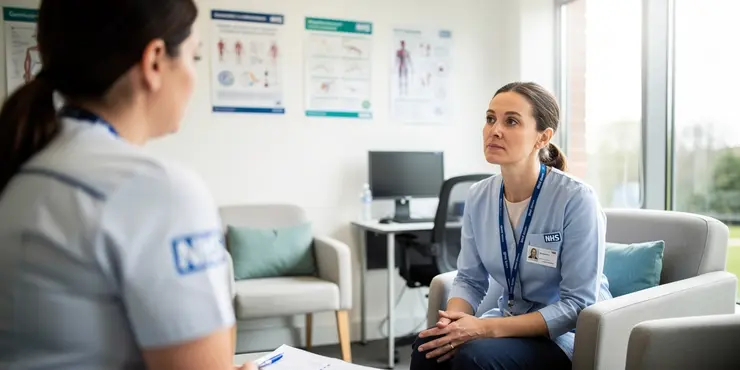
Is genetic screening available for cancer risk?
Relevance: 36%
-
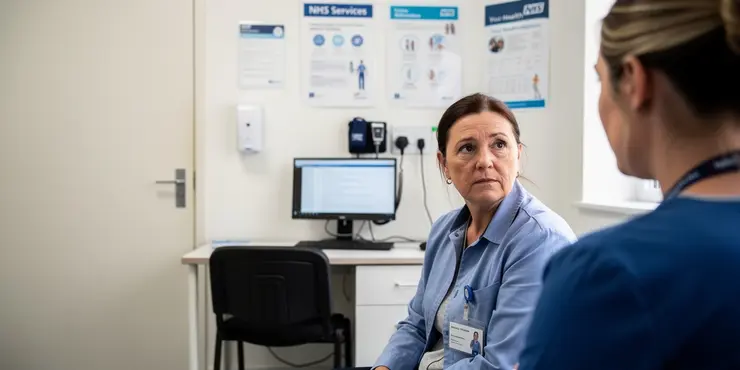
Does Paillon treatment treat all types of cancer?
Relevance: 34%
-
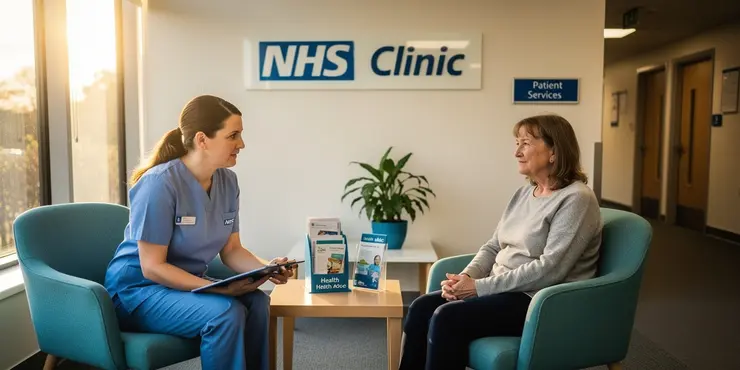
What is Cancer?
Relevance: 34%
-
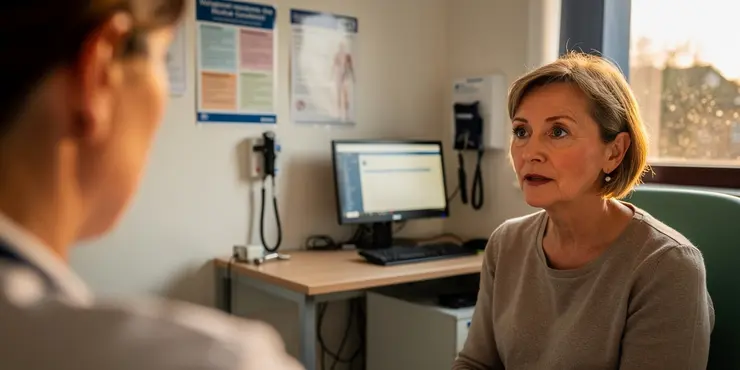
Vaginal Cancer
Relevance: 33%
-

Ovarian Cancer
Relevance: 33%
-

Endometrial Cancer
Relevance: 33%
-

Vulval Cancer
Relevance: 33%
-

Endometrial Cancer
Relevance: 33%
-

Endometrial Cancer
Relevance: 33%
-

What is the difference between colon cancer and rectal cancer?
Relevance: 33%
-

What is cancer screening?
Relevance: 32%
-
What is testicular cancer?
Relevance: 32%
-

What is colorectal cancer?
Relevance: 32%
-
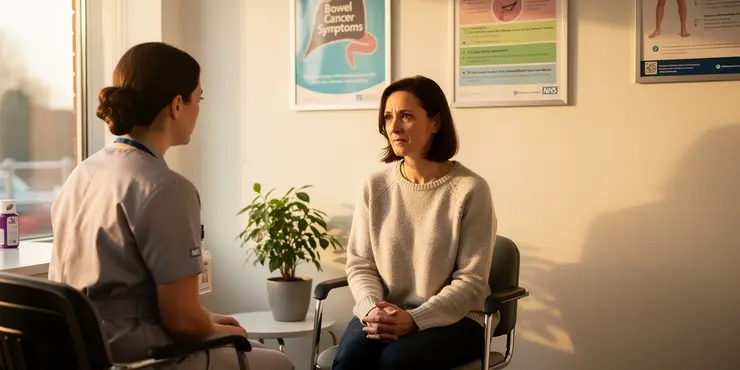
What is Bowel Cancer?
Relevance: 32%
-

Treating prostate cancer
Relevance: 32%
-

Mouth Cancer Awareness
Relevance: 32%
-

What is testicular cancer?
Relevance: 32%
-
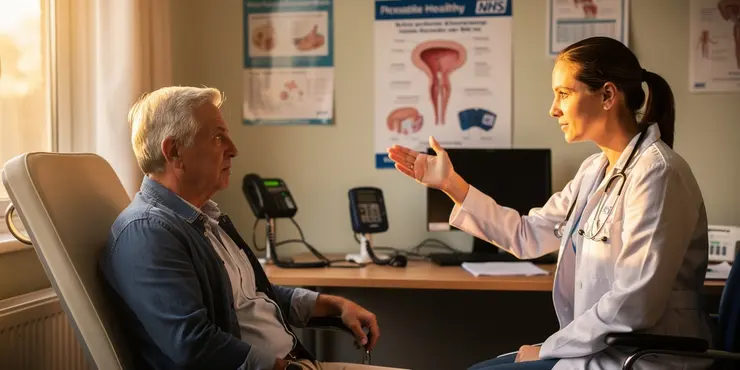
What is Prostate Cancer?
Relevance: 32%
-
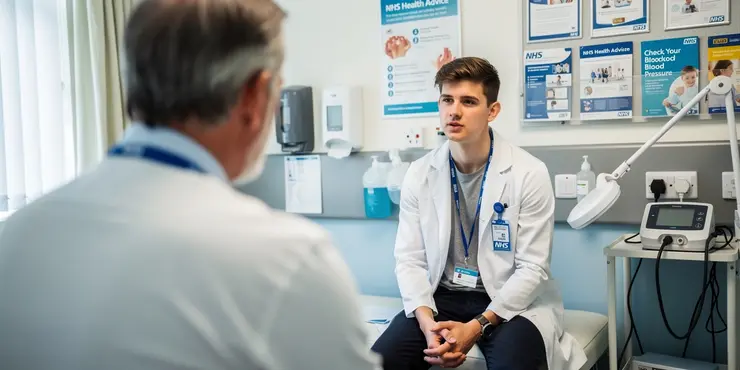
What is testicular cancer?
Relevance: 32%
-

Is testicular cancer treatable?
Relevance: 32%
-
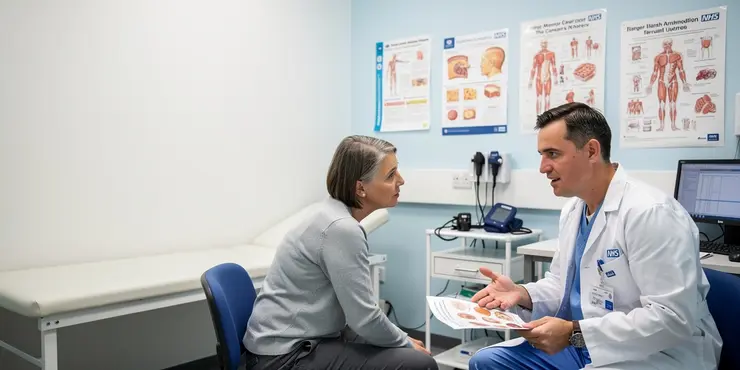
Skin cancer education
Relevance: 32%
-

Living with prostate cancer
Relevance: 32%
-

Mouth Cancer Infomercial
Relevance: 32%
-
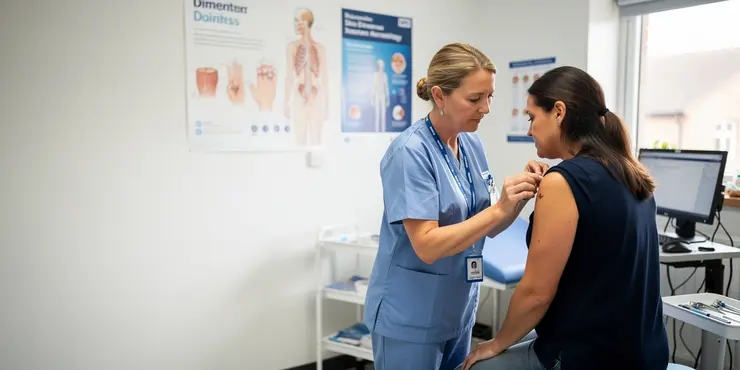
Skin Cancer - How do I check if my mole is skin cancer? | NHS
Relevance: 31%
-
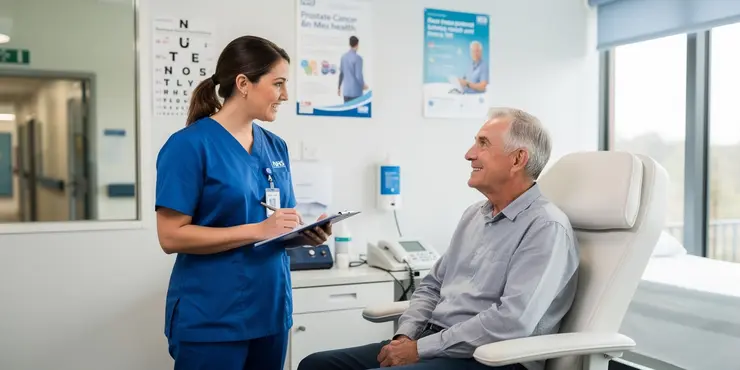
Breakthrough in Cancer Treatment Offers Hope for Prostate Cancer Patients
Relevance: 31%
-
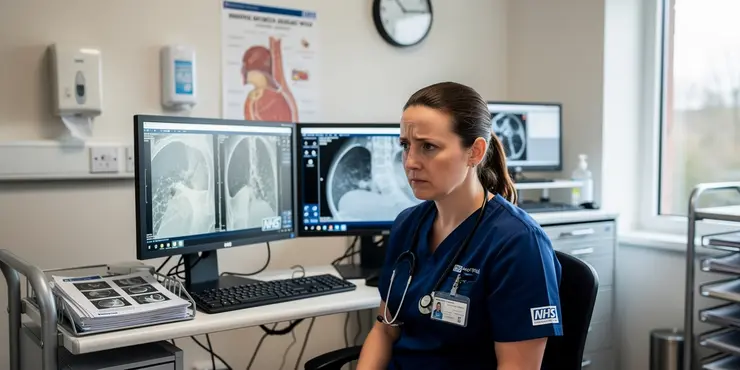
AI Breast Cancer Screening in the UK
Relevance: 31%
-

How common is testicular cancer?
Relevance: 31%
-

What causes testicular cancer?
Relevance: 31%
-

What is a skin cancer screening?
Relevance: 31%
-
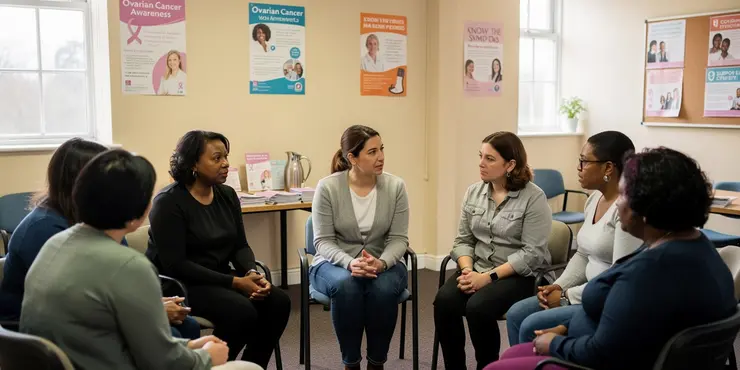
Raising awareness of ovarian cancer
Relevance: 30%
-
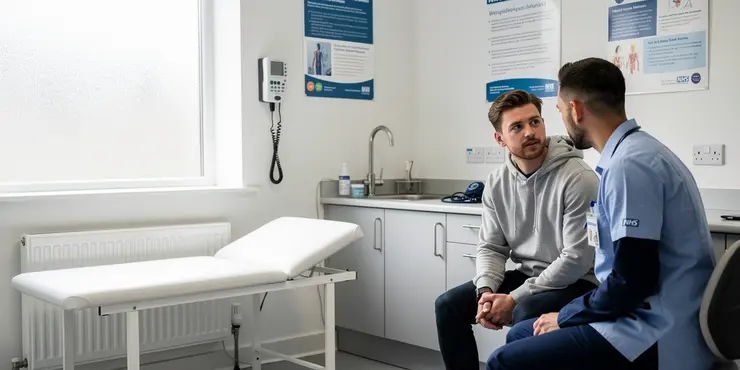
What are the stages of testicular cancer?
Relevance: 30%
-

How is prostate cancer treated?
Relevance: 30%
-

Who is at risk for testicular cancer?
Relevance: 30%
-
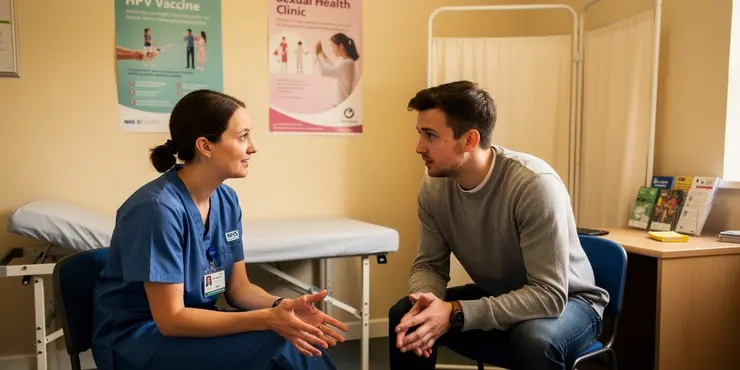
Can HPV lead to cancer?
Relevance: 30%
-
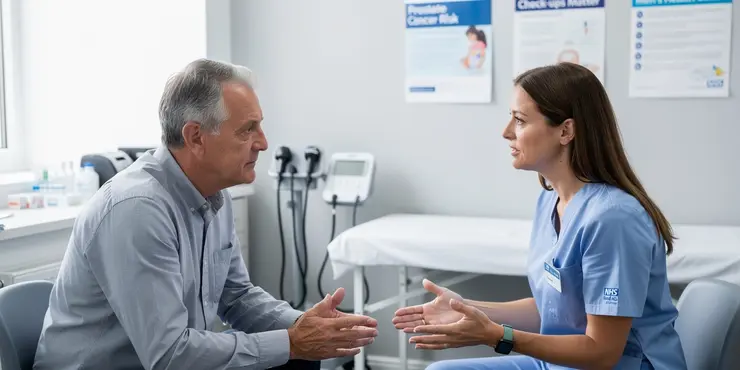
Am I more at risk of prostate cancer?
Relevance: 30%
-
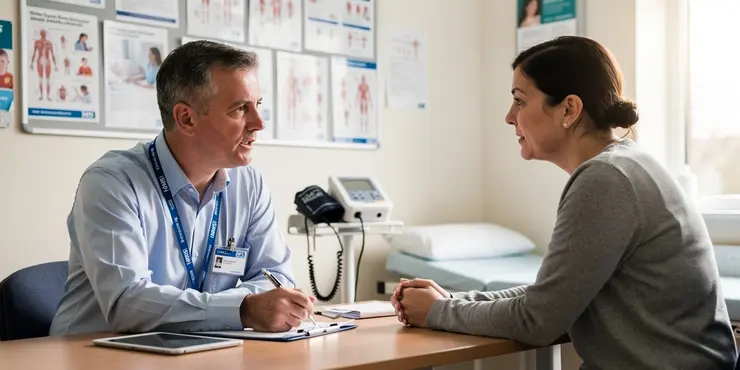
Why is there a surge in bowel cancer?
Relevance: 30%
-

How to do the FIT bowel cancer screening test | Cancer Research UK
Relevance: 30%
What is Pancreatic Cancer?
Pancreatic cancer, originating in the pancreas, poses a significant challenge in oncology due to its late detection and poor prognosis. Symptoms like jaundice, abdominal pain, and weight loss often surface only in advanced stages, complicating treatment. Risk factors include smoking, obesity, and genetic predisposition. Treatment options, including surgery, chemotherapy, and radiation, vary depending on disease stage. However, due to early metastasis, curative treatments are limited to localized cases. Despite ongoing research to improve detection and treatment, pancreatic cancer still carries a dismal five-year survival rate of around 10%. Efforts continue to enhance early detection methods and develop more effective therapies, offering hope for better outcomes in the future.
Treatment options for pancreatic cancer
- Surgery: Surgical removal of the tumor may be possible for localized pancreatic cancer. Procedures include Whipple procedure (pancreaticoduodenectomy), distal pancreatectomy, or total pancreatectomy.
- Chemotherapy: Drugs are used to kill cancer cells or slow their growth. Chemotherapy can be administered before surgery (neoadjuvant chemotherapy) to shrink the tumor, after surgery (adjuvant chemotherapy) to kill any remaining cancer cells, or as the primary treatment for advanced cancer.
- Radiation therapy: High-energy beams, such as X-rays or protons, are targeted at the cancer to destroy the cancer cells or stop their growth. It may be used alone or in combination with chemotherapy.
- Targeted therapy: These drugs target specific abnormalities in cancer cells to disrupt their growth and survival. For example, drugs that target the HER2/neu protein or drugs that inhibit angiogenesis (formation of new blood vessels) may be used.
- Immunotherapy: This treatment uses drugs to help the immune system recognize and attack cancer cells. While not yet a standard treatment for pancreatic cancer, ongoing research is exploring its potential.
- Clinical trials: Participation in clinical trials offers access to novel treatments and therapies that are still under investigation.
Treatment plans are tailored to each individual's specific situation, and a multidisciplinary team of healthcare professionals, including oncologists, surgeons, radiation oncologists, and others, will collaborate to determine the most appropriate approach.
World Pancreatic Cancer Day - No Time to Wait
Understanding Pancreatic Cancer
Pancreatic cancer occurs when malignant cells form in the tissues of the pancreas. It is known for its rapid progression and high mortality rate, often due to late diagnosis. This aggressive form of cancer tends to spread quickly to nearby organs, making early detection crucial.
The Significance of World Pancreatic Cancer Day
Observed on the third Thursday of November each year, World Pancreatic Cancer Day aims to raise awareness about this deadly disease. The theme, “No Time to Wait,” underscores the urgency of early detection and timely treatment to improve outcomes for patients. The day's goal is to educate the public, encourage research, and support those affected by pancreatic cancer.
Pancreatic Cancer in the United Kingdom
In the UK, pancreatic cancer remains a significant health challenge. It ranks as the 10th most common cancer but is the fifth leading cause of cancer-related deaths. Symptoms such as jaundice, abdominal pain, and weight loss often appear only at advanced stages, making it crucial to advocate for more research funding and better diagnostic tools.
How You Can Make a Difference
There are several ways you can contribute to the fight against pancreatic cancer. Participate in local awareness campaigns, donate to organisations like Pancreatic Cancer UK, and consider volunteering your time. By spreading knowledge about early signs and advocating for better healthcare resources, we can make strides in combating this disease.
Conclusion
World Pancreatic Cancer Day serves as a powerful reminder that there is no time to wait when it comes to this aggressive cancer. Join the movement to educate, advocate, and support ongoing efforts to find a cure. Early detection saves lives, and your participation could make a crucial difference in the battle against pancreatic cancer.
What is Pancreatic Cancer?
Pancreatic cancer starts in the pancreas. It is hard to treat because it is usually found late. Symptoms like yellow skin (jaundice), belly pain, and losing weight often show up only when the cancer is advanced. This makes treatment difficult. Risks include smoking, being overweight, and family history. Treatments like surgery, medicines (called chemotherapy), and radiation depend on how far the cancer has spread. If the cancer is found early, it's easier to treat. But this is rare. Many people still don’t survive long after being diagnosed, as only about 10 out of 100 people live more than five years. Doctors are working hard to find ways to detect pancreatic cancer earlier and find better treatments. This gives hope for the future.
Treatment options for pancreatic cancer
- Surgery: Doctors might be able to take out the cancer with an operation if it's only in one place. Types of operations include removing parts of the pancreas (like the Whipple procedure).
- Chemotherapy: Special drugs help kill cancer cells or make them grow slower. Sometimes, these drugs are given before surgery to make the tumor smaller, or after surgery to kill any leftover cancer cells.
- Radiation therapy: This uses powerful beams, like X-rays, to kill cancer cells. It can be used alone or with chemotherapy.
- Targeted therapy: This treatment uses drugs that attack specific parts of cancer cells to stop them from growing.
- Immunotherapy: These drugs help the body’s own defense system to fight cancer. Scientists are still studying how it can help with pancreatic cancer.
- Clinical trials: Taking part in clinical trials gives patients a chance to try new treatments that are not yet widely available.
The best treatment plan is different for everyone. A team of doctors, including cancer specialists and surgeons, will work together to find the best plan for each person.
World Pancreatic Cancer Day - No Time to Wait
Understanding Pancreatic Cancer
Pancreatic cancer starts when bad cells grow in the pancreas. This cancer grows fast and is very serious. It often gets found late, which makes it harder to treat. It can spread to other parts of the body quickly, so finding it early is important.
The Significance of World Pancreatic Cancer Day
This special day happens on the third Thursday in November every year. It is to teach people about pancreatic cancer. The message is “No Time to Wait” because finding the cancer early helps people get better. The day is to help people learn, encourage new research, and support those who have the cancer.
Pancreatic Cancer in the United Kingdom
In the UK, pancreatic cancer is a big health problem. It is the 10th most common cancer, but it causes many deaths. People usually do not notice symptoms like yellow skin, tummy pain, and losing weight until it is very late. It is important to have more money for research and better ways to find the cancer early.
How You Can Make a Difference
You can help fight pancreatic cancer in different ways. Join local events to talk about the cancer, give money to groups like Pancreatic Cancer UK, and volunteer your time. By sharing what you know about the early signs and asking for better healthcare, you can help beat the cancer.
Conclusion
World Pancreatic Cancer Day reminds us that there is no time to wait to fight this cancer. Be a part of teaching, supporting research, and helping find a cure. Discovering the cancer early can save lives, and your help is important in the fight against pancreatic cancer.
Frequently Asked Questions
What is World Pancreatic Cancer Day?
World Pancreatic Cancer Day, observed on the third Thursday of November, is dedicated to raising awareness about pancreatic cancer, its symptoms, and the importance of early detection.
When is World Pancreatic Cancer Day in 2023?
In 2023, World Pancreatic Cancer Day will be observed on November 16th.
Why is early detection of pancreatic cancer important?
Early detection of pancreatic cancer significantly improves the chances of successful treatment. Unfortunately, this type of cancer is often diagnosed at a late stage when treatment options are more limited.
What are the common symptoms of pancreatic cancer?
Common symptoms include abdominal pain, jaundice, weight loss, fatigue, and changes in stool. However, symptoms can be vague and may not appear until the cancer is advanced.
How common is pancreatic cancer in the UK?
Pancreatic cancer is the 10th most common cancer in the UK. Each year, about 10,000 people are diagnosed with this disease in the country.
What can I do to observe World Pancreatic Cancer Day?
You can observe the day by spreading awareness, participating in events, wearing purple (the symbolic colour), or supporting pancreatic cancer research and patient support organisations.
How is pancreatic cancer diagnosed?
Pancreatic cancer is diagnosed through a combination of imaging tests, blood tests, and biopsy procedures. Early diagnosis is challenging due to non-specific symptoms.
What are the risk factors for pancreatic cancer?
Risk factors include smoking, diabetes, chronic pancreatitis, family history of pancreatic cancer, and certain genetic conditions. Age and obesity are also contributing factors.
What treatment options are available for pancreatic cancer?
Treatment options include surgery, chemotherapy, radiation therapy, and targeted therapy. The choice of treatment depends on the stage and location of the cancer, as well as the patient's overall health.
How can I lower my risk of developing pancreatic cancer?
To lower your risk, avoid smoking, maintain a healthy weight, eat a balanced diet, exercise regularly, and manage underlying conditions such as diabetes and chronic pancreatitis.
Is pancreatic cancer hereditary?
While most cases are not hereditary, about 10% of pancreatic cancers are linked to inherited genetic mutations. If you have a family history of the disease, discussing genetic testing with your doctor may be helpful.
What advancements are being made in pancreatic cancer research?
Research advancements include the development of new diagnostic methods, targeted therapies, immunotherapies, and better understanding of the genetic mutations involved in pancreatic cancer.
How can I support someone with pancreatic cancer?
Support can be provided by offering practical help, being emotionally available, accompanying them to medical appointments, and helping them access support groups and counselling services.
What organisations in the UK offer support for pancreatic cancer patients?
Organisations such as Pancreatic Cancer UK, Macmillan Cancer Support, and Cancer Research UK offer various resources, support, and information for patients and their families.
Where can I find more information about World Pancreatic Cancer Day?
You can find more information on the official World Pancreatic Cancer Day website, as well as resources from pancreatic cancer organisations like Pancreatic Cancer UK and the World Pancreatic Cancer Coalition.
What is World Pancreatic Cancer Day?
World Pancreatic Cancer Day is a special day. It helps people learn about a type of cancer called pancreatic cancer.
On this day, people try to understand more about the illness. They also think of ways to help those who are sick.
Here are some things you can do on this day:
- You can talk to your friends or family about what you learn.
- You can draw or color pictures to show you care.
- Use special apps or videos that explain pancreatic cancer in simple words.
World Pancreatic Cancer Day is a special day. It happens on the third Thursday of November. On this day, people learn about pancreatic cancer. They talk about what signs to look for and why finding it early is important.
What day is World Pancreatic Cancer Day in 2023?
World Pancreatic Cancer Day is a special day.
In 2023, it is on November 16.
This day helps us learn about pancreatic cancer.
If you want to know more, you can use tools like audio books or videos.
World Pancreatic Cancer Day is on November 16 in 2023.
Why is it important to find pancreatic cancer early?
Finding pancreatic cancer early is very important. It helps doctors treat it better. When cancer is found early, there are more ways to help make you feel better.
Here are some things that can help:
- Go to the doctor for check-ups.
- Tell your doctor if you feel sick or have pain.
- Ask someone you trust to come with you to the doctor.
- Write down questions you want to ask the doctor.
Finding pancreatic cancer early gives a better chance to help the person get better. But sadly, doctors usually find this cancer late when there are fewer ways to treat it.
What signs show you might have cancer in your pancreas?
Some signs of this illness are belly pain, yellowing skin, losing weight, feeling very tired, and changes in poo. But these signs can be hard to notice and might not show up until the illness is serious.
If you find these things hard to understand or remember, you might find it helpful to use tools like pictures, videos, or talking with someone who can explain it in a simple way.
How many people get pancreatic cancer in the UK?
A lot of people want to know how many get this illness called pancreatic cancer. It's important to understand the number of people who have it in the UK.
If the words are hard, you can ask someone to help read. You can use a tool that reads words out loud too.
Pancreatic cancer is a type of cancer. It is the 10th most common cancer in the UK. Every year, around 10,000 people find out they have this cancer.
How can I take part in World Pancreatic Cancer Day?
Here are some simple things you can do:
- Wear purple clothes. Purple is the color for the day.
- Tell friends and family about pancreatic cancer.
- Share stories or pictures on social media.
- Give to a charity that helps with pancreatic cancer.
- Join a local event or walk.
Ask someone for help if you need it. You can use pictures or videos to understand better.
You can join in the day by telling people about it, going to events, wearing purple (that's the special color), or helping groups that study pancreatic cancer and help people with it.
How do doctors find out if someone has pancreatic cancer?
Doctors use tests to see if a person has pancreatic cancer. They might use:
- Scans like X-rays or MRIs to look inside the body.
- Blood tests to find signs of cancer.
- Biopsy where a small piece of the pancreas is checked by doctors.
If you find reading hard, you can:
- Ask someone to read this to you out loud.
- Use a ruler or your finger to help keep track of your place.
- Look at pictures or watch videos to help understand.
You can find out if someone has pancreatic cancer by doing different tests. These include scanning pictures inside the body, blood tests, and taking a small piece from the pancreas to look at it closely. It is hard to find pancreatic cancer early because the signs are not clear.
If you find it hard to read, you can try:
- Reading slowly or asking someone to help you read.
- Using a reading ruler or colored overlay to follow each line of text.
- Listening to the text read out loud by using apps or tools.
What makes it more likely to get pancreatic cancer?
Pancreatic cancer can happen more often if:
- You smoke cigarettes
- You are very overweight
- Someone in your family had pancreatic cancer
- You have diabetes
- You drink a lot of alcohol
If you find it hard to read, you can:
- Ask a friend or family member to read it with you
- Use a screen reader to listen instead of reading
- Read slowly and take your time
Things that can make you more likely to get sick are:
- Smoking
- Having diabetes
- Long-term problems with your pancreas (called chronic pancreatitis)
- If someone in your family had pancreatic cancer
- Certain genetic conditions (passed down from your parents)
- Being older
- Being very overweight
Here are some tips that might help:
- Try to quit smoking with help from doctors or quit-smoking programs.
- Eat healthy foods and exercise to stay fit. This can help with obesity, diabetes, and overall health.
- Keep in touch with your doctor and ask them questions.
What are the treatment choices for pancreatic cancer?
If someone has pancreatic cancer, doctors have different ways to help. Here are some options:
- Surgery: Doctors can do an operation to try to remove the cancer.
- Medicine: There are strong medicines called chemotherapy that can help fight the cancer.
- Radiation: This is a special kind of light that can help shrink the cancer.
It’s important to talk to doctors and nurses who can help explain what each choice means. Using pictures or videos can also help understand better. Family or friends can come along to help listen and ask questions too.
There are different ways to treat cancer. These include surgery, chemotherapy, radiation therapy, and targeted therapy. The best choice depends on the size and place of the cancer and also on how healthy the person is.
How can I make it less likely to get pancreatic cancer?
To stay healthy, try to do these things:
- Do not smoke.
- Keep a healthy body weight.
- Eat different kinds of healthy foods.
- Exercise often.
- Take care of any health problems like diabetes.
Using picture charts or reminder apps can help you remember these things.
Can you get pancreatic cancer from your family?
Most of the time, pancreatic cancer is not passed down in families. But 10 out of every 100 cases are because of changes in genes that you get from your parents. If people in your family had this cancer, talk to your doctor about a special test to check your genes. This might help.
What new things are scientists learning about pancreatic cancer?
Scientists are learning new ways to find and treat pancreatic cancer. They have found new tests and treatments that are very smart. They are learning how our body can fight cancer better. They are also finding out more about the changes in genes that can cause this cancer.
How can I help someone with pancreatic cancer?
Pancreatic cancer is a serious illness. Here are some ways to help someone with this cancer:
- Listen: Let them talk about their feelings. Be a good listener.
- Be there: Spend time with them. Sometimes they just need company.
- Help with chores: Offer to do things like cooking or cleaning.
- Go to appointments: Offer to go with them to doctor visits.
- Learn: Find out more about pancreatic cancer. It helps you understand what they are going through.
- Be patient: They might have good and bad days. Be patient and kind.
It's important to show you care and want to help. You can also reach out to cancer support groups for more ideas.
We can help by doing things like:
- Helping with everyday tasks.
- Listening and being there for them.
- Going with them to see the doctor.
- Helping them talk to support groups or a counselor.
Who helps people with pancreatic cancer in the UK?
Here is a list of places that can help:
- Some groups can talk to you and your family.
- Some places give support and advice.
- Ask your doctor for more information.
You can also use the internet to find help.
There are places that can help people who have pancreatic cancer. Some of these are Pancreatic Cancer UK, Macmillan Cancer Support, and Cancer Research UK. They have a lot of support, information, and help for patients and families.
You can call them to talk or read their websites for more information. They have friendly people ready to help. Remember, it is okay to ask for help!
How can I learn more about World Pancreatic Cancer Day?
You can find more information about World Pancreatic Cancer Day by looking online. Use simple tools like Google to search. Try typing "World Pancreatic Cancer Day" into the search box. You can also ask a friend or family member to help you find information. Libraries are a good place too. You can ask a librarian to help you find books about it.
You can learn more on the World Pancreatic Cancer Day website. You can also get help from groups like Pancreatic Cancer UK and the World Pancreatic Cancer Coalition.
Useful Links
This website offers general information and is not a substitute for professional advice.
Always seek guidance from qualified professionals.
If you have any medical concerns or need urgent help, contact a healthcare professional or emergency services immediately.
Some of this content was generated with AI assistance. We’ve done our best to keep it accurate, helpful, and human-friendly.
- Ergsy carfully checks the information in the videos we provide here.
- Videos shown by Youtube after a video has completed, have NOT been reviewed by ERGSY.
- To view, click the arrow in centre of video.
- Most of the videos you find here will have subtitles and/or closed captions available.
- You may need to turn these on, and choose your preferred language.
- Go to the video you'd like to watch.
- If closed captions (CC) are available, settings will be visible on the bottom right of the video player.
- To turn on Captions, click settings .
- To turn off Captions, click settings again.
More Items From Ergsy search
-

What is Pancreatic Cancer?
Relevance: 100%
-

World Pancreatic Cancer Day - No Time to Wait
Relevance: 89%
-

Can Ozempic lead to pancreatitis?
Relevance: 49%
-

Is genetic screening available for cancer risk?
Relevance: 36%
-

Does Paillon treatment treat all types of cancer?
Relevance: 34%
-

What is Cancer?
Relevance: 34%
-

Vaginal Cancer
Relevance: 33%
-

Ovarian Cancer
Relevance: 33%
-

Endometrial Cancer
Relevance: 33%
-

Vulval Cancer
Relevance: 33%
-

Endometrial Cancer
Relevance: 33%
-

Endometrial Cancer
Relevance: 33%
-

What is the difference between colon cancer and rectal cancer?
Relevance: 33%
-

What is cancer screening?
Relevance: 32%
-
What is testicular cancer?
Relevance: 32%
-

What is colorectal cancer?
Relevance: 32%
-

What is Bowel Cancer?
Relevance: 32%
-

Treating prostate cancer
Relevance: 32%
-

Mouth Cancer Awareness
Relevance: 32%
-

What is testicular cancer?
Relevance: 32%
-

What is Prostate Cancer?
Relevance: 32%
-

What is testicular cancer?
Relevance: 32%
-

Is testicular cancer treatable?
Relevance: 32%
-

Skin cancer education
Relevance: 32%
-

Living with prostate cancer
Relevance: 32%
-

Mouth Cancer Infomercial
Relevance: 32%
-

Skin Cancer - How do I check if my mole is skin cancer? | NHS
Relevance: 31%
-

Breakthrough in Cancer Treatment Offers Hope for Prostate Cancer Patients
Relevance: 31%
-

AI Breast Cancer Screening in the UK
Relevance: 31%
-

How common is testicular cancer?
Relevance: 31%
-

What causes testicular cancer?
Relevance: 31%
-

What is a skin cancer screening?
Relevance: 31%
-

Raising awareness of ovarian cancer
Relevance: 30%
-

What are the stages of testicular cancer?
Relevance: 30%
-

How is prostate cancer treated?
Relevance: 30%
-

Who is at risk for testicular cancer?
Relevance: 30%
-

Can HPV lead to cancer?
Relevance: 30%
-

Am I more at risk of prostate cancer?
Relevance: 30%
-

Why is there a surge in bowel cancer?
Relevance: 30%
-

How to do the FIT bowel cancer screening test | Cancer Research UK
Relevance: 30%


